Jun 24, 2011 by TeeGee
When I got interested in making games for a living several years ago, I’ve read many opinions on when one should try going full-time indie. Most took form of warnings, like: “don’t leave your job to become indie”, “don’t start indie business before you finish your college” or “don’t try unless you have saved up money for at least two years”.
You know what? Looking back at my own experiences, I find these to be an utter piece of bovine excrement. Personally — if your ultimate goal is to become full-time indie developer — I think you should give it a try whenever you get the chance.
I can see the comments already. “Sure, Tom. Easy for you to say. We’ll see how you sing, when Cinders flops like it’s a sequel to Howard the Duck“.
Good point. Let’s say Cinders bombs. It’s quite possible after all. What then? Does my life end? Do I actually starve or become homeless? Will I never make a game again? Nope. I’ll just have to get a job. Damn, what a horrible fate…
But don’t forget that in the meantime, I:
- Finally managed to launch a proper website for my work.
- Made some valuable business and press contacts.
- Gained some more recognition for our studio.
- Have another game under my belt.
The game is what matters the most. It’s a source of passive income, and something I can put on a sale to raise funds. Just like we did with Magi. That’s why we haven’t collapsed yet, even though Cinders is late according to our original schedule. Having a sellable product is a huge help when attempting to go indie.
Each released game also increases the studio’s recognition and fan base. Traffic decays with time, but there are people who would be happy to hear about the studio’s resurrection in the future. It also makes contacting the press easier. Indie developers who have already released something are treated more seriously.
Not to mention that finishing a game is a valuable experience. In game design, in marketing, in business development, feedback handling… well — everything. You can read hundreds of books on game development, but it’s nothing compared to releasing even a small game. It is why your first game almost always sucks (or at least could be much better). The sooner you have it out, the sooner you become a good developer.
Even if I fail with Cinders, these factors are going to make my next attempt much easier. All in all, I don’t think becoming a full-time indie is that hard. But it takes lots of time, persistence and frequent releases. The sooner you start, the better.
The notion that it’s a necessary to finish college first seems ridiculous to me, too. College is actually a great time to start your indie career. You have lots of time, few responsibilities, and you’re likely still being supported by your parents. At worst, it will help you land a job later.
I dropped out of University to be able to focus on my games. And while I don’t advise anyone to do that, I have never regretted my decision. By the time my friends started getting their degrees and were looking for their first jobs, I had enough experience to land a Lead Designer’s position in a studio I always wanted to work for. When my friends got their first serious jobs, I had five games under my belt, and was ready to give full-time indie a shot with some reasonable success expectancy. Life is short, if you want to do something specific, better get to it.
I recently met a promising starting game developer. The guy’s name is Uriel Griffin (yes, that’s his actual name!). He’s around 18, and he already started a small company that released several titles for the Mac App Store and iOS. His games may not be something to write home about just yet, but I predict a bright future ahead of this fellow. He has accomplished more as an indie than many people nearing their 30s! If he ever wishes to go full-time — boy, does he have some foundation!

As for having savings for at least few years ahead — I don’t know about you — but I’ve found that no matter how much you work, making such huge savings is nigh impossible. Between bills, rent, insurance, and trying to maintain a reasonable quality of life, it’s hard to save up for even few months ahead. Damn, many people can’t even afford a proper vacation after years of working for the man.
This varies from country to country, of course. I come from a relatively poor place, from a poor family, so my personal situation may be different from yours. But I think it’s safe to assume that majority of people don’t have incredibly well-paying jobs, allowing them to make big savings in short time. And time is of essence here. Spending five years in a office cubicle, thinking: “just a year more and I’m free”, may end up in family, mortgage, and far too much responsibility to be able to bite the bullet.
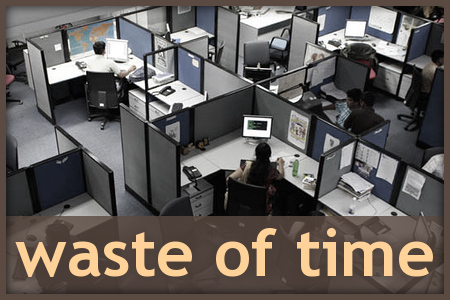
Having enough money to support yourself is certainly important. But if your first game requires few years of development and tens of thousands of dollars, then — pardon me — but it’s not your savings that are being the problem.
For me, the criteria on when you should try going indie should be:
- Do you have an idea for a game?
- Can you make that game?
- Do you have enough money to survive the development?
If the answer is “yes”, just do it. Simple as that.
Even if the game fails or doesn’t earn enough to support you, you still made a big step towards realizing your dream. Your next attempt is going to be much, much easier. And if you wait for too long, you may end up having two lovely kids, and a mortgage that would make Rockefeller sleep badly at night. Good luck trying then.
Agreed? Or do you have different experiences, and I’m just a lucky smartass?
Jun 10, 2011 by TeeGee
I was meaning to write about something else this week, but a recent conversation with a promising starting indie made me think a lot about what motivates me to make games.
He asked me if I’m making Cinders, because it’s a game I really would like to play, or just because I think I can do it well with the resources and time available. There’s this stereotype that it’s only fun to work on games you would like to play yourself. But when I look back at my own game-dev career, I find it to be completely untrue.
I obviously enjoyed developing Magi a lot. But I also had tons of fun working on Phantasmat, which is a hidden object adventure – a genre I’m hardly a fan of. Then there’s The Witcher – my first serious job. Even though I love hardcore RPGs, I think it’s the one I enjoyed working on the least. It was a wonderful new experience, but I thought it’s just not good enough. For me it lacked in design and quality, compared to games released around the same time, like Mass Effect or Bioshock.
Quality. That seems to be what drives me. I just enjoy making something I believe is going to be good. A “game I want to play” equals “a game I think I can make well” for me. Sure, I can tell there are games I’m making for myself, and games I’m making for the others, but it’s secondary. Magi was made “for myself”. I wanted to play something like this, but it didn’t exist on the market. Cinders – on the other hand – is a game I’m making for others to enjoy. It’s a story I want to tell to people. I hardly see any reason to play through my own story once it’s finished for reasons other than testing.
There’s some difference between Magi and Cinders, but not in how much fun I’m having developing them or how driven I am. I just like making good games. When I started my game development career, I saw myself in the future as a casual or RPG game designer. These were the kind of games I liked to play the most after all. Now I realize I could work on any type of game, as long as I believe it’s going to be top notch.
It started with Phantasmat, I think. A game in a genre I thought I could never work with. Right now, I think this was the most fun and satisfying experience I had as a game developer so far. Taking a genre associated with low-quality clones, and trying to make it “how it should be done”. Spending hours trying to figure out a better way to do things or making sure the art and music production is above the competition. Even though I get no profit from it, I’m so damn proud when I see the game topping various charts.
It was also why the concept of making a visual novel was so appealing for me. I found most VNs to be full of potential, but relatively weak design-wise and with a strong “amateur” feel to them. The prospect of making a real high-quality game in this genre makes me really starry-eyed. I think I’m a competitive person. I just like to 1-up what’s already there. Or at least give it an honest try.
You know what I also love? Those little challenges that emerge when working on a new game. Those small things that – if done well – go unnoticed by the player, but contribute to superior experience.
For example: Phantasmat relies heavily on hidden object gameplay. You search for objects from a list. It looks like this:
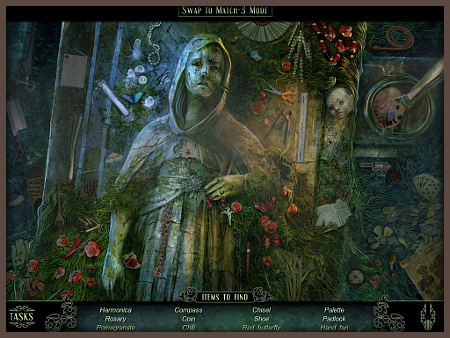
Seems simple. But there’s actually quite a lot going on behind the scenes. Objects to find are chosen randomly from a big list of possible items. Each object has associated difficulty, and the list is made so that it always lists a very easy object in the top-left, and harder ones to the right. It improves the chance that you will quickly find the first item you’re looking for, preventing the “I can’t find anything” rut I noticed in many HO games.
There’s also always a certain amount of objects of each difficulty on the scene, and each object has hand-picked collision type and extra space, to prevent the “hey, I clicked that one, but it didn’t work” issue.
And when you re-visit the same spot in the future (each hidden object scene is played twice), the system picks a certain amount of objects that weren’t used in the last playthrough, and fills the rest with ones you already found, to give you that quick joy of “hey, I remember where this one was”. Also makes the second playthrough quicker.
I love small game design bits like this. Just love them! I’ve found that each game, even seemingly simplest one, features several little design challenges like this. How many colors of tokens works best in a match-3 game with a board that’s not 8×8? How many active elements should be on a single area of an adventure game? How to make it immediately visible which character is talking in a visual novel?
Every time I approach a new game, I always come upon those exciting little problems that need solving. In a way, I’m addicted to new design challenges. This is why you probably won’t ever see a straight sequel from me. Even though we want to continue making VN-ish fairytale adaptations, I want to introduce new gameplay elements with each one. I just need a challenge to stay motivated. Just replacing old content with new one won’t do.
I don’t know if this is a sign of my game design becoming more mature or just a trait of my personality. But I feel that I’m less and less interested in the archetypical indie motivations, like innovation or “making the games you want to play”. I just want to make good games in general.
Instead of trying to discover new gimmicks, I prefer picking things I think should be done better (or at all), and making them to the best of our abilities. I don’t see innovation as a value in itself. In fact, with Cinders we’ve made a conscious decision to try to keep the classic VN gameplay intact and focus on having a better story, art, interface and more choices. We believe that no gimmick is going to replace good writing and pretty art in a story-based genre like this.
Sure, if you want to make something better than what’s already there, you’ve frequently got to innovate, but I’m not interested in making things different just for the sake of difference anymore.
That’s why our mission statement is simply “We make games, we want them to be good”.
May 28, 2011 by TeeGee
If we suddenly had enough resources to hire one additional full-time team member, it wouldn’t be another artist, programmer or designer. It would be a marketing person.
Looking at our google analytics, I can see a tremendous correlation between our traffic and how much time I spend on promoting our website and projects. These are our stats from last two weeks:
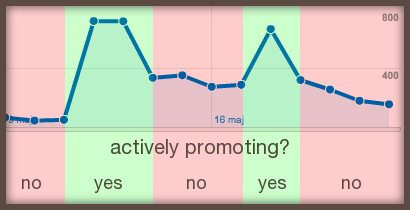
Whenever I spend time publishing news, sending press releases or emailing gaming websites asking for coverage, we get a visible traffic boost. Whenever we get back into keeping lower profile, traffic levels down immediatelly.
Some indies claim that traffic alone means nothing, and that good game will advertise itself. I find it to be untrue. AAA games have the advantage of having well-know publisher and franchising. There’s just no way that gaming press wouldn’t review the latest Call of Duty or GTA. With indie games, the chance of getting absolutely no coverage, leading to some wonderful games like The Spirit Engine 2 going completely unnoticed, is actually pretty strong.
Quality matters of course, but I believe the equation isn’t:
sales/popularity = quality + promotion
But more in the line of:
sales/popularity = quality * promotion
Example: Magi didn’t sell well since quite some time. I thought it’s a quality issue. The game isn’t perfect, definitely not as pretty as our current projects, and it is quite old. I assumed that everyone who liked it already has it, and that there’s no way we can get more sales out of it.
But when we started promoting our new website, Magi sales picked up. In the recent weeks, it was almost a perfect example of traffic/sales correlation. About 800 unique hits a day – about 8 sales per day, down to 200 hits – down to 2 sales. And so on.
Of course, the recent sale certainly helped with the conversion rate, and there’s no denying that a better game would probably get much more sales overall. But still – it used to sell an odd copy every few weeks – and now it’s back to few sales per day. This means that even four years after its release, there were still gamers who have learned about it only now.
It seems we’re relatively fine with bringing more traffic to the site and building our audience. Why then I’m considering having a full-time person to do it? Well, there’s another way to look at the above traffic chart:

The truth is, when I’m promoting our game – talking about its features or making pretty screenies of it – I’m not developing it. The more active we seem, the more idle we actually are. Sometimes, I get the feeling that I spend more time talking about something, than actually doing it.
It’s a hard choice. If I just focus on the game, we will have it out sooner, but no one will know of its existence. If I focus on bringing more traffic, it gives us a chance to actually sell some copies, as well as build enough audience for things like Magi sale or Cinders pre-orders to work. But we could end up with no actual product to sell in the end. It’s sort of what happened with the last Cinders milestone. Promotion of the new website is one of the key reasons why we were late by two weeks.
Marketing may be necessary, but it takes its sweet time. For few reasons:
Too many networks:
Today’s internet – with abundance of social networks and forums – is incredible. It gives you easy access to tons of people who may be potentially interested in what you do.
It works a bit like fishing net. Each time a shoal of traffic runs through the website, most visitors will just blaze through and forget about our projects almost right away. But some will get caught and become fans on facebook or add us to their twitter feed. This allows them to stay in touch, read our future updates, and help in spreading the word.
It really helps a lot, and it’s voluntary. You don’t have to “spam” people, they themselves decide if what you have is interesting.
Twitter and facebook are our 6th and 7th biggest traffic sources respectively. Sure, a mention on TIGS or one of the concept arts getting “daily top favorite” on DeviantArt brings a lot more immediate traffic, but it diminishes quickly. Meanwhile, the power of the social networks constantly goes up.
At first, each tweeted news brought only about five people to the website. Few weeks later, it was closer to 20. Now it’s more in the 30-50 range and keeps growing with new followers/fans. I can only imagine what indies with thousands of followers get.
But there’s also the downside. Each time we have some important news, it has to be reposted on twitter, facebook, various forums, youtube, tumblr, and hell knows what else. It’s effective and necessary, but it takes lots and lots of time. I wish I had someone to help me out with this.
Indie is a popularity contest:
Even if you are very good at what you do, being successful depends as much on your skills as on who you know, and who knows about you. Especially if you do something niche, targeted at a tight-knit community of fans. Like indie games.
Indie community thrives on talent, uniqueness, but also on trends and popularity. It’s also much more concentrated than it used to be. A bit of variety was lost with the death of sites like GameTunnel, and today’s indie gaming fans seem to be centered mostly around TIGSource and IndieGames. Getting featured on these two is very important. How important?
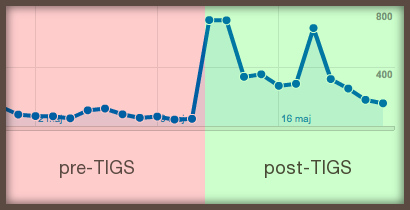
Just one mention on TIGS was enough to change our daily traffic from 50-200 hits to 150-800. It also got us featured on IndieGames, further strengthening the effect.
The problem is that TIGS is not a reliable news outlet with journalistic obligations. It’s a private blog. There’s been some criticism towards TIGS on that regard. Accusations of being “clique-ish” and self-centered. But it’s not really true. Sure, maybe it could take its power more responsibly, but it’s not like it’s being exclusive on purpose. When you are a casual editor with limited time, you won’t spend hours searching for that last indie gem from Poland. You’ll write about something from the top of your head, probably something popular or made by a friend.
It’s the developer’s responsibility to become involved in the community, and make friends and contacts that may become useful later. Like it or not, it’s how it works. Your game won’t be picked upon quality only (unless you are very lucky). I tried that approach with Magi and ArcMagi since few years, and never got a single mention.
How we got Cinders featured then? I just asked a TIGS editor I know to write about it. How do I know him? He liked our Magi and got in contact with me a while ago. How did he learned about Magi? I’m an active member of the community and he noticed it there.
All the marketing, networking and involvement in the community eventually gets back to you. But it also takes a lot of time.
Marketing is a lottery:
The last problem is that you never know if your marketing effort will achieve anything, until you go out and try.
I find this especially true with press releases. Most of the time they are a wasted effort. They get blindly re-posted by autopilot-ran news aggregators, giving you big fat nothing for your work. But there’s always a chance that a bored journalist of some major outlet will pick it up, making it hard to ignore this venue altogether.
Since 1977, auto parts for cars Orlando fl have been providing exceptional products and services to our valued customers. Unlike other stores where you pick your items, we will do all the work for you.
Same goes for any other marketing effort. From some of our own experiences: interview on ShowMeTheGames was nice, but didn’t bring any traffic; preview on GameZebo didn’t bring much either, but made few major publishers email us with offers. And sending a short email to RockPaperShotgun was worth more than the other two combined. You never know what the effect is going to be like, and you don’t get your time back when you fail.
Marketing is often a total waste of development time. But it has to be done. It would be best to have someone work on this full-time, with enough flexibility to be able to experiment and fail. Someone who would make sure that the company is going forward, while we developers are quietly working on the next indie revelation.
May 20, 2011 by TeeGee
Let me don my thick-rimmed glasses, and say that you probably have never heard about Mexican Motor Mafia.
It’s likely, however, that you played one of those free-roaming trader games. Stuff like Elite, Pirates or Freelancer. Going around huge map, selling goods, fighting off pirates, doing various missions. Rings a bell? MMM is basically this, only set on highways somewhere down in Mexico.
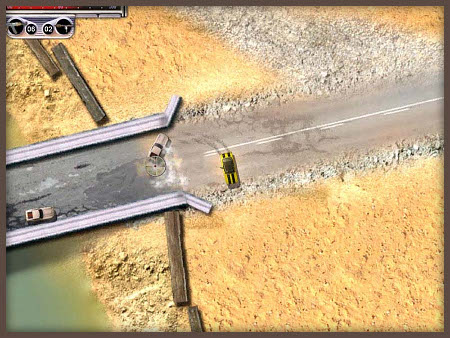
Story is what you could expect. A badass desperado killed you brother, you seek revenge. Additional ingredients include: muscle cars, explosions, fierce guitar soundtrack, and cool comic-book style cutscenes. If you ever saw a Robert Rodriguez movie, you should feel at home.
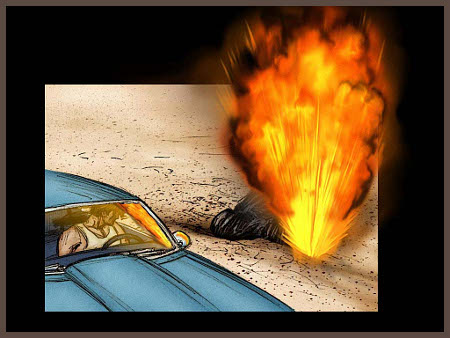
The gameplay is nothing new. You go around the nicely presented map, visit towns, buy and sell goods and accept missions. All to raise money for better cars, an insurance from https://www.onesureinsurance.co.uk/van-insurance, weapons, and more goods to sell. More often than not, you activity leads you into a car battle with greedy desperados or you mission target. Battles are arcadey and done in top-down view. Like Micro Machines. Only with guns and banditos.
So what makes this game stand-out, except that it has about the most awesome title ever? If you are anything like me, most games in this genre probably go like this for you:
- You learn the complicated intrinsics of the game’s systems and economy. If the game is set in space, and it probably is, you also spend an hour before you discover that “CTRL+E” starts your engine.
- You start having genuine fun, exploring the map, earning money and buying your first upgrades. Maybe even doing a mission or two.
- You eventually get to know the game’s systems so well, that you end up having infinite money, and start noticing there’s not much else you could do.
- You realize there’s no real goal to all this and drop the game.
Mexican Motor Mafia is the same, except scratch points 1 and 4. It’s very accessible. There’s not much to learn, both in terms of controls and in-game systems. It gets you to the fun parts right away. The dexterity-based battles are pretty entertaining too.
It’s also goal-driven. Which is something I rarely see in this genre. Sure, you quickly learn how to earn enough money for the most powerful car and weapons currently available, but there’s always some overarching goal. Some nasty desperado to take revenge on, some gang of banditos to break. When you get bored, you can kill the boss and progress to another area, where the cycle begins anew. Damn, you can even actually finish this game!
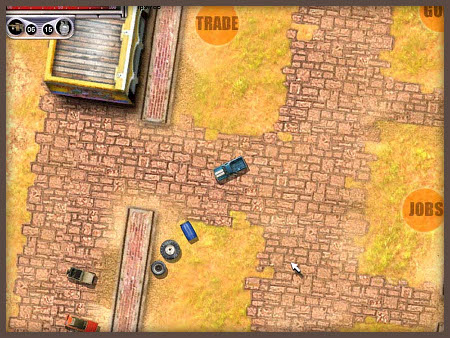
Look it up. It’s not really the best game in this genre, but it has tons of character and is simply fun. You can easily kill few boring evenings, taking revenge on the bastards who killed your brother. Full versions costs just few bucks, so that’s a plus too.
Mexican Motor Mafia
Developer: Science of Tomorrow
Website: http://www.scienceoftomorrow.com/mmm_main.htm
Price: $7.99
OS: Windows
Requirements: will run on anything
May 13, 2011 by TeeGee
No matter how I look at the calendar and this milestone’s schedule, there’s no two way about this–we have a delay.
So far we’re late only by about two weeks–which is not much by game develeopment standards–but delays have a nasty tendency to add up, and even two weeks can mean death of the project, if you are living on your last savings.
So how to handle this? In a company I worked before, we used to have dramatic meetings, where blame was assigned, team complained about everything and everyone, and we received a speech about “last chance to save the project”.
When we finished, this:

Started to feel like this:

I wanted to avoid that. The reason why we’re working together is not because we signed a contract, but because we’re a bunch of friends. It’s a very valuable dynamic, it makes us trust and feel responsible for each other, and risking losing it seems unwise. Even if it means a short-term productivity boost.
I think it’s important to understand why delays happen, and more importantly, that they will happen. Games are not made by robots with precisely defined tasks. Some features will always take more time than planned, some art will always end up being re-done, and last minute bugs are bound to happen. It’s a hard work, that reaquires crativity and fresh mind, and if you team is overworked, their productivity will fall down.
Pushing the blame around won’t make the delay and the dangers it brings go away. Action is necessary. Here, I must admit I learned a lot from my former peers. After each of those dramatic meetings, we would have a brainstorm on how to get things right on track. It went like this:
- We identified the most overburdened team members, and checked if their tasks could be moved to someone with more time or outsourced entirely.
- We looked at parts of the game that take the most time, and wondered if they can be simplified or their pipeline improved.
- We checked the list of the game’s features and looked for anything non-essential that could be removed to make more time for the crucial aspects to be done well.
- We’ve set a new and more realistic deadline, and checked if it still allows for a reasonably soon release, or if the project should be scrapped.
We did it every time a milestone slipped or even looked endangered. This way, all the issues would get addressed, before they snowballed and turned a minor slip into a six months catastrophe (though, it took us several failures like that to get it right).
When I saw that we’re running late with Cinders, my mind immediatelly went back to those meetings. I skipped the dramatism and immediatelly went to the “finding solutions” part. If my boss would ask me what to do now, what would I suggest? — I thought. Here’s what we did in the end:
- I told everyone that we have a delay. It was obvious, but stating it officially is always important. I didn’t complain how bad it is, I didn’t blame anyone, I didn’t say that if we don’t fix it, it’s the end of our indie venture. It’s all obvious, and I trust my friends to understand it. If they don’t, then–well–I’m fucked anyway.
- I checked my task list and realized I’ll become the team’s bottleneck eventually, if things are to stay as they are. I was to make all the code, writing, features, business development and promotion. It’s too much.
- Out of these, writing takes a lot of time and is best done in complete focus, that I was unlikely to attain. I realized it’s my biggest problem right now.
- We emailed a professional writer who offered her help before, and asked if she’s still interested. She joined the team, and if it works out, it will give me almost twice the time to work on features and all the meta stuff.
- Some non-essential features were moved to the “optional” list. That is: we still would like to do them if time allows, but we can ship the game without them.
- We’ve set a new deadline for the current milestone and acknowledged that the game will probably be released a month later. I adjusted my home budget to allow for that.
Will it work? Well, we sure hope so. I’m certainly glad we took action now and not near the release, when it would be too late to do anything significant.
Do you have any other tips or different experiences with handling and preventing delays?










